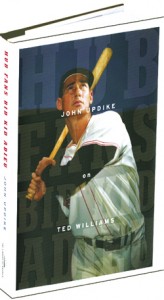 Review of Hub Fans Bid Kid Adieu: John Updike on Ted Williams (Library of America, cloth, 64pp., $15)
Review of Hub Fans Bid Kid Adieu: John Updike on Ted Williams (Library of America, cloth, 64pp., $15)
Updike lovers will want to add this book to their collections for the sentimental value alone. Updike was working on this project in the months before he died, and a new two-and-a-half page preface is dated January 2009. Plus, the jacket was designed by none other than Chip Kidd, who crafted many a book cover for Updike’s Knopf releases. The Library of America has produced a handsome book, one of which Updike would have approved—and probably did approve.
Open the covers and the first thing you appreciate is that the inside boards and endsheets are printed with blown-up typescripts of Updike’s original first and last pages of “Hub Fans.” Though “Hub Fans” was published in Assorted Prose, “Ted Williams” in Odd Jobs, and “The Batter Who Mattered” in Due Considerations, it’s nice to have all of what Updike had to say about one of his heroes in a single volume—especially since the preface is new and he “abridged, conflated, and updated” the Williams’ mid-life sketch and obituary.
In the new preface, Updike calls “Hub Fans” a “five days’ labor of love” and admits that Roger Angell is “a baseball freak where I was just a Williams freak.” In “Hub Fans” Updike had praised Williams’ “rigorous pride of craftsmanship,” and in this new preface he talks about how he had been “drawing sustenance and cheer from Williams’ presence on the horizon.”
The back cover of the dust jacket lists “praise through the decades for ‘Hub Fans,’” and the praise is dizzying. “The most celebrated baseball essay ever,” says Roger Angell, who knows a thing or two about baseball. “The greatest writer, in the greatest ballpark, on the greatest hitter who ever lived,” says Boston Globe sports columnist Dan Shaughnessy. “No sportswriter ever wrote anything better,” Garrison Keillor writes. “The piece that changed the way the sport is written. Updike made baseball the lyricist’s game.” But the biggest compliment came from Williams himself. Updike writes in the preface that Williams, through an agent, invited him to write Williams’ biography. And knowing how Updike felt about biographies makes that revelation all the more fun.
Highly recommended (reviewed by James Plath)
